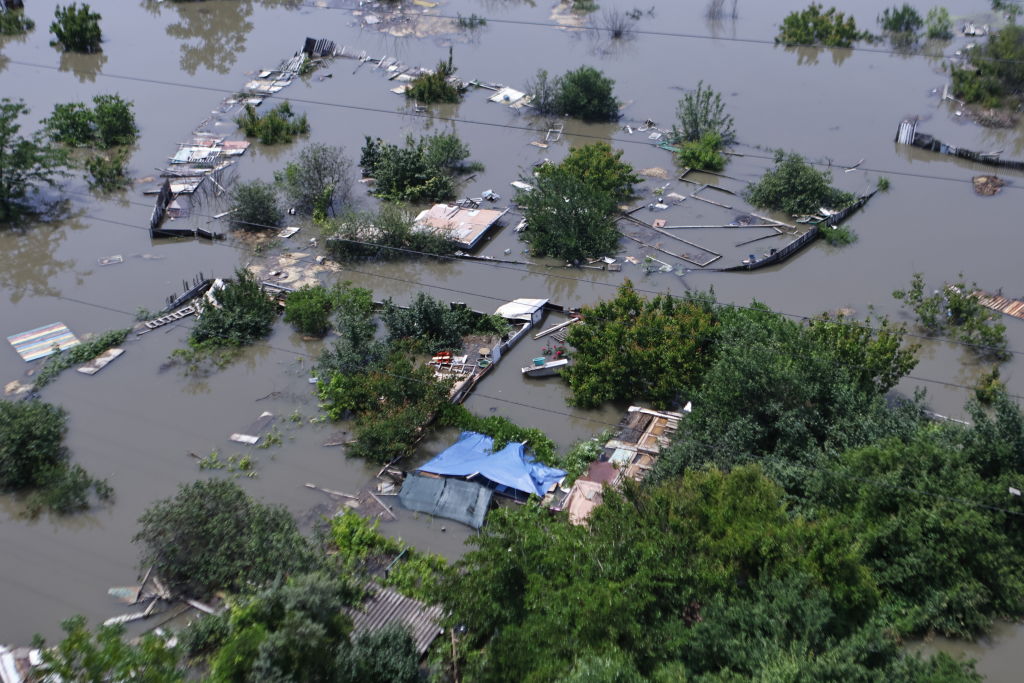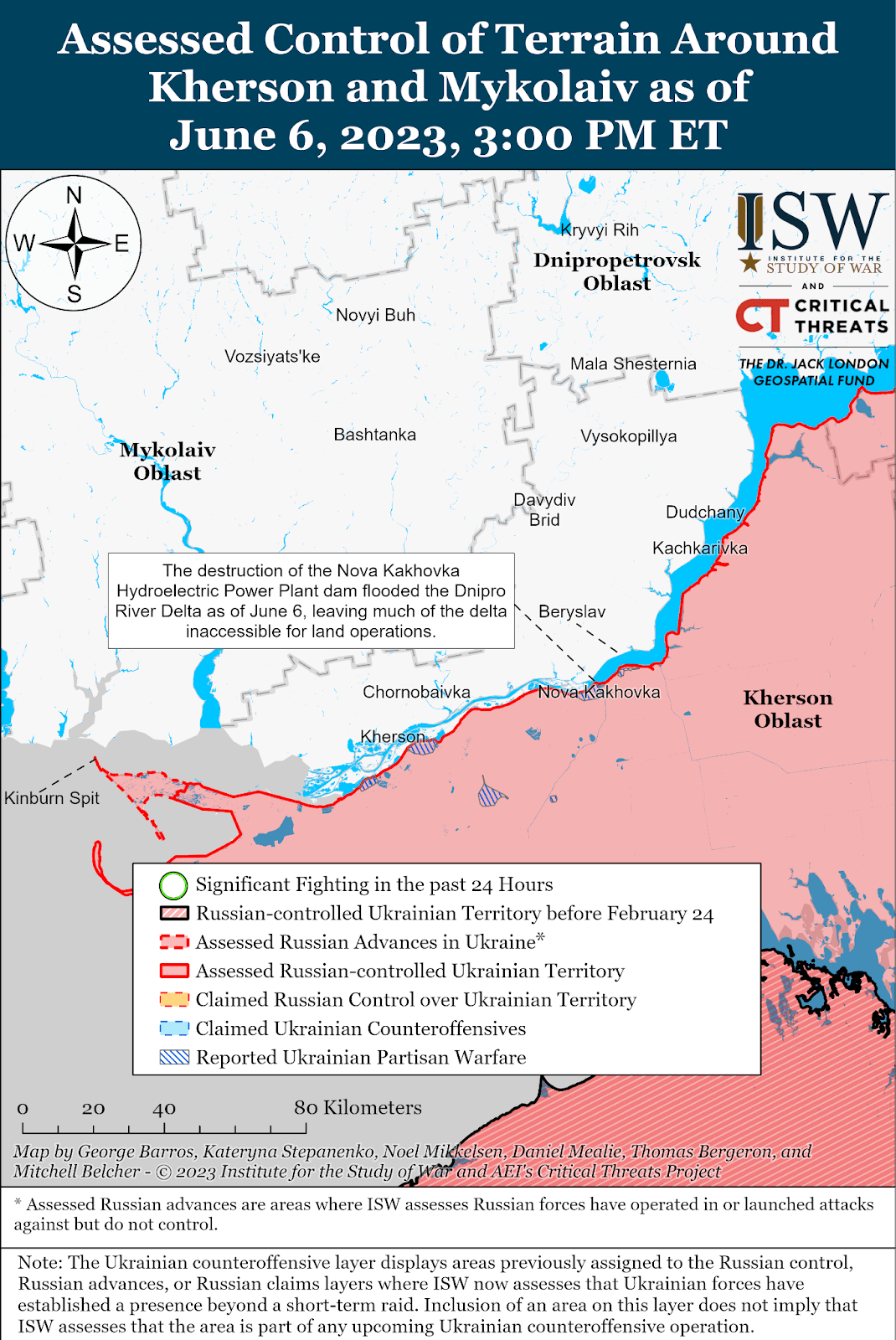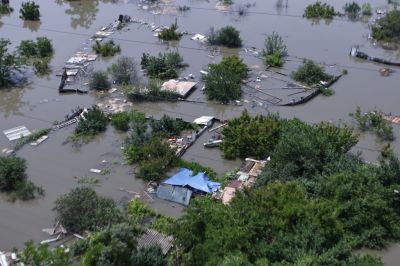Happy Thursday! The Dispatch softball team remains undefeated!
Sure, our first game was postponed last night due to a code red air quality alert in D.C.—but we’ve got a big old zero in the loss column.
Quick Hits: Today’s Top Stories
- Smoke from more than 400 wildfires in Canada—which have forced 120,000 Canadians to evacuate—is blanketing much of the Northeast, placing nearly 100 million people in 18 states under air quality alerts. In New York City yesterday, the Air Quality Index topped 400 out of 500, the worst in the world, and the Federal Aviation Administration temporarily grounded flights at LaGuardia Airport due to low visibility. The White House has deployed more than 600 U.S. firefighters and support personnel to Canada, along with equipment to help quench the fires, but the National Weather Service predicts little improvement today.
- Former Vice President Mike Pence announced Wednesday he’s running for president, promising to uphold the Constitution and arguing Donald Trump’s actions on January 6, 2021, disqualified him for the presidency. Pence also portrayed himself as more traditionally conservative than other candidates on abortion, spending, and foreign policy, pledging continued support for Ukraine and exhibiting a willingness to reform Social Security and Medicare to address the national debt. He’s currently polling under 4 percent nationally to Trump’s 53 percent. Former software executive and current North Dakota Gov. Doug Burgum also announced Wednesday he’s running for the GOP presidential nomination, highlighting his experience passing pension reform, term limits, and tax cuts.
- Prosecutors have reportedly informed Trump’s legal team he’s the target of a criminal investigation—a step that often, though not always, precedes an indictment—over his mishandling of classified documents. Special counsel Jack Smith has been investigating the handling of documents, as well as Trump’s efforts to remain in office after the 2020 election. A federal grand jury in Florida has reportedly been hearing testimony on the latter investigation, and former White House official Steve Bannon has been subpoenaed to testify. The news comes one day after the New York Times reported former Trump chief of staff Mark Meadows had testified before a grand jury as part of Smith’s probe.
- Former Attorney General Bill Barr contradicted Democratic Rep. Jamie Raskin’s recent claim that the Trump Department of Justice had closed an investigation into bribery allegations against then-Vice President Joe Biden that are now at the center of a dispute between House Republicans and the FBI. “On the contrary, it was sent to Delaware for further investigation,” Barr said on Wednesday. Republican House Oversight Committee Chairman James Comer on Wednesday dropped plans to hold FBI head Christopher Wray in contempt of Congress after Wray agreed to let the full committee see a document detailing the bribery allegations, plus two related documents. Previously, only Comer and Raskin, his Democratic counterpart, had been allowed to view the report.
- The Commerce Department reported Wednesday the United States’ imports rose 1.5 percent in April from March to a seasonally adjusted $323.6 billion, reflecting higher prices from ongoing inflation as well as rising demand for cars and car parts, industrial supplies, and cell phones and household goods. The proportion of goods imported from China dropped to 15.4 percent over the year ending in April, the lowest level since October 2006. U.S. exports, meanwhile, fell 3.6 percent amid softening global demand.
- President Biden on Wednesday vetoed a Republican-led resolution that would have blocked his plan to cancel up to $20,000 in federal student loans per borrower. It’s the fifth veto of Biden’s presidency—and comes as the Supreme Court considers the constitutionality of the plan. Loan payments are set to resume in August.
- House leadership has canceled votes for the rest of the week as several hardline GOP lawmakers deployed stall tactics to protest the debt ceiling deal Speaker Kevin McCarthy brokered with Democrats. The members reportedly want to renegotiate the deal struck in January to give McCarthy the speakership gavel, though McCarthy said they hadn’t offered specific demands.
- Portland, Oregon’s city council voted 3-1 to drop its rarely enforced ban on camping on public property, instead allowing overnight camping provided campers don’t block private property, schools, or businesses. Three-time violators of the restrictions may face fines and up to 30-day prison terms. The homeless population in Oregon climbed nearly 23 percent from 2020 to 2022, and a state law taking effect July 1 requires cities and counties to adopt “objectively reasonable” rules for what homeless people can do on public property, codifying a federal court ruling banning local governments from arresting people for sleeping rough if the municipality offers insufficient shelter capacity.
- Ukrainian Foreign Minister Dmytro Kuleba said Wednesday his nation will open 10 new embassies in Africa—starting in Rwanda and Mozambique—and will increase agricultural exports and military cooperation on the continent. Ukraine’s efforts to strengthen ties follow some African nations’ reluctance to oppose Russia’s invasion. South Africa, for instance, abstained from a United Nations resolution condemning Russia’s aggression, has since conducted naval exercises with Russia, and has invited Russian President Vladimir Putin to a summit in August despite an international warrant against him.
Dam Russians

In the summer of 1941, Joseph Stalin’s secret police committed what one British war correspondent called an “unparalleled stroke of patriotic destruction”: blowing up the Dnipro Dam near Zaporizhzhia in Soviet-era Ukraine to slow the Nazi advance. An official death toll was never released, but thousands of civilians are believed to have died in the resulting flooding. “People were screaming for help,” one eyewitness told a Ukrainian TV station decades later. “Cows were mooing, pigs were squealing. People were climbing on trees.”
The Russian playbook may not have changed much in the intervening 82 years. In the early hours of Tuesday morning—June 6, when much of the world commemorates D-Day, the beginning of the operation that would liberate Europe during World War II—Ukraine’s Kakhovka Dam, under Russian control, burst. The cause of the dam’s failure is still unknown with both sides of the conflict blaming one another, but the flooding only compounds humanitarian and environmental disasters ravaging the war-torn country—and does so just as Ukraine is beginning its counteroffensive against the invading Russian forces.
The dam and hydroelectric plant sit on the Dnipro River, the southern frontline in Kherson Oblast. Territory north of the river has been in Ukrainian hands since the Russians withdrew from Kherson in November. Everything south of the river is under Russian occupation, as the map below—from the Institute for the Study of War—illustrates.

Based on satellite imagery, the dam showed only slight visible damage earlier this month, until Tuesday, when the water from the reservoir—so large some residents call it the Kakhovka Sea—began rushing through a massive breach in the structure.
Officials in Kyiv and Moscow immediately began pointing fingers, each maintaining the others were responsible for the dam’s collapse. Ukrainian President Volodymyr Zelensky described the disaster as the work of “Russian terrorists” who are “ a threat to everything living,” claiming the dam was “mined by Russian occupiers.” The Kremlin, meanwhile, labeled the dam failure an act of “sabotage” by Ukraine—with Russian Defense Minister Sergei Shoigu claiming it was an effort to stave off Russian attacks following what he called a failed counteroffensive. The Russian governor of the occupied territory south of the river suggested a Ukrainian missile strike was responsible for the breach.
Ukraine, however, insisted the massive piece of infrastructure would have been impossible to destroy with an outside attack using missiles or shelling—a claim backed up by several ballistics experts. Explosives aside, the dam—which had already been damaged in the fighting—could have also failed due to negligence by occupying Russian forces. In war-time conditions, however, a forensic investigation that could conclusively indicate why the dam collapsed is unlikely.
While the White House has yet to say who it believes is responsible, some unnamed Western officials have said the intelligence community is leaning toward Russia as the likely culprit. NATO General Secretary Jens Stoltenberg and German Chancellor Olaf Scholz seemed to reach a similar conclusion. “This is an outrageous act, which demonstrates—once again—the brutality of Russia’s war against Ukraine,” Stoltenberg said in Slovakia Tuesday. At an event in Berlin, Scholz argued the dam’s destruction “joins many, many of the crimes we have seen in Ukraine that have emanated from Russian soldiers.”
The flooding downstream from the busted dam is significant. According to Zelensky, roughly 80 inhabited settlements are at risk. The water levels in the Dnipro River have risen as much as 40 feet, flooding much of the city of Kherson, some 50 miles south of the dam. The Ukrainian government has moved swiftly to evacuate affected residents, but Zelensky told Politico yesterday Russian forces have been shooting at rescuers attempting to reach people (and animals) trapped in the flooding. The head of Kherson’s regional administration estimated Wednesday about 1,700 people had been evacuated thus far.
Speaking from the flood zone Thursday, Zelensky praised rescue workers for their ongoing efforts. “I visited a crossing point where people are being evacuated from flooded areas,” he said on Telegram. “Our task is to protect lives and help people as much as possible.”
Rescue efforts have reportedly not been as robust in Russian-controlled areas. “We know that the Russian occupation administration on the left bank has not been anywhere near as proactive,” says Karolina Hird, a Russia analyst with the Institute for the Study of War who has followed the humanitarian impacts of the war. “So it’s really going to be difficult to determine the casualty count and the human toll of this.” Vladimir Saldo, the Kremlin-appointed governor of the occupied territory, claimed as many as 40,000 people remain stranded on the Russian side, while his deputy said around 1,300 had been evacuated—but Hird tells TMD the Russians will likely “not have accurate reporting on this.”
The evacuations that do occur in the occupied area create a different set of problems, as Russian authorities will likely move affected Ukrainians on their side of the river even further into Russian-held territory. “Forced relocation under the guise of humanitarian evacuations is something that we’ve seen very consistently throughout the war in Ukraine, specifically in the south,” Hird says.
While the flooding itself is obviously damaging, its knock-on effects are also dire. The floodwaters are carrying with them harmful pollutants that could sicken both rescuers and the stranded—and contaminate drinking water for tens of thousands of people. Zelensky said approximately 150 tons of industrial lubricant were released into the river when the dam failed, and 300 more could spill at any time. Plus, there’s the possibility that the water rushing through minefields may have dislodged unexploded land mines or changed the topography such that they may be difficult to locate again, creating yet another deadly hazard.
And the abundance of water downstream is causing a water shortage upstream. Almost 25,000 acres of agricultural land are underwater in Kherson, but with the Kakhovka reservoir quickly emptying, Ukraine’s agricultural ministry said as much as 94 percent of the irrigation systems in Kherson—part of the so-called “breadbasket of Europe”—are now bone dry. The result, according to the agricultural ministry, could be “fields in southern Ukraine perhaps turning into deserts.”
Just for good measure, there’s a nuclear risk to draining the reservoir too. The water usually held back by the Kakhovka dam is used to cool reactors at the Zaporizhzhia nuclear plant—the largest in Europe, which has been under Russian control since the beginning of the war. Anticipating that water levels in the reservoir may continue to fall, the International Atomic Energy Association said Wednesday the plant was reverting to backup measures. “It is essential that the integrity of both the ZNPP cooling pond and of the ZTPP discharge channel is maintained,” IAEA Director General Rafael Mariano Grossi said Wednesday, referring to the pond that cools the plant’s reactors and the thermal power plant which brings water from the reservoir to the cooling ponds. “This is critical so the plant has sufficient water to provide essential cooling to the site for the months ahead.”
As we wrote you earlier this week, the blown dam comes just as it seemed the long-awaited Ukrainian counteroffensive might have been ramping up. Many analysts expected the big push to begin near Kherson, where Ukrainian forces could try to sever the land bridge linking Russia to occupied Crimea. Kyiv has signaled its plans are unchanged by the flooding, but its forces could have difficulty advancing across the river while also trying to contain the humanitarian fallout of the disaster.
Most of the significant fighting of late, however, has been north and east of the flood zone, near Donetsk. “This is very far away from the areas of theater where we’ve actually been seeing an increase in military activity last week,” Hird tells TMD. “So it doesn’t seem—both tactically on the ground and also from signaling for the Ukrainians—that this disaster will impact Ukraine’s ability to conduct its counteroffensives whenever and wherever it chooses to do so.”
Worth Your Time
- Across political, geographic, and generational lines, people agree that their fellow humans just aren’t as moral as they used to be. But a new study published in Nature suggests there’s no clear evidence of this broad-based moral decline and argues biased memory might be causing the misperception. “Biased exposure means that things always look outrageous: murder and arson and fraud, oh my!” co-author Adam Mastroianni writes in an explanation of the study. “Biased memory means the outrages of yesterday don’t seem so outrageous today. When things always look bad today but brighter yesterday, congratulations pal, you got yourself an illusion of moral decline.” This mental trap, Mastroianni argues, should make us cautious about hair-on-fire policy prescriptions. “If you think that morality is declining, then you must think that some switch has been flipped in society, causing it to produce worse humans,” he writes. “No doubt you would want to un-flip that switch, whatever you think it is: Smash the social media companies! Kill all the politicians! Ban the bad books! None of that is going to reverse the trend, because the trend doesn’t exist.”
- New languages don’t just magically appear on Google Translate. Particularly for languages with smaller native speaking populations, a dedicated team of volunteers is required. Meet 31-year-old Iraqi Bokan Jaff, who spearheaded the effort to add Sorani Kurdish—spoken by about 8 million people—to Google Translate. “They spent countless hours translating words from Sorani into other languages, and verifying the translations of others on Google Crowdsource, eventually creating a beta version of the Translate platform,” Winthrop Rodgers reports for Rest of World. It’s not quite perfect. “Translate will occasionally confuse the Kurdistan Democratic Party, one of the ruling parties of Iraqi Kurdistan, with the Kurdistan Workers’ Party, a militant group fighting for Kurdish rights in Turkish Kurdistan,” Rodgers writes. “The two are fierce rivals within Kurdish nationalism.” But Jaff’s hometown hailed him as a hero when the platform launched, and he’s proud of what he accomplished. “‘It is a time of technology,’” Jaff said. “‘Now, Kurdish Sorani is a global language.’”
Presented Without Comment
SCOTUS Blog: Justices File Annual Financial Disclosures—Thomas and Alito Delay
Also Presented Without Comment
AV Club: Arnold Schwarzenegger on Death: “It Truly Pisses Me Off”
Also Also Presented Without Comment
Insider: Pete Davidson Admits He and Colin Jost Were ‘very Stoned’ When They Paid $280,100 for a Decommissioned Staten Island Ferry and He Regrets Buying It
Toeing the Company Line
- In the newsletters: The Dispatch Politics team reports on Chris Christie’s entrance into the race and a weird book ban fight in Arizona, Jonah kicks off a grab-bag G-File (🔒) with some thoughts on what Christie brings to the presidential race, Scott explains (🔒) what Los Angeles’ bus stop boondoggle exposes about the pitfalls of bureaucracy, and Nick recoils from the PGA-LIV merger.
- On the podcasts: National security guru Klon Kitchen returns to the Remnant to answer all your pressing questions about how AI will reshape our world.
- On the site: Mike and Drucker cover Pence’s campaign launch, and Thomas Dorsey walks through the affirmative action challenges headed to the Supreme Court.
Let Us Know
Who do you think is responsible for the dam’s collapse? How does the recent report indicating Ukrainian forces were likely behind last year’s Nord Stream pipeline attack—which the Biden administration initially blamed on Russia—affect your view?








Please note that we at The Dispatch hold ourselves, our work, and our commenters to a higher standard than other places on the internet. We welcome comments that foster genuine debate or discussion—including comments critical of us or our work—but responses that include ad hominem attacks on fellow Dispatch members or are intended to stoke fear and anger may be moderated.
With your membership, you only have the ability to comment on The Morning Dispatch articles. Consider upgrading to join the conversation everywhere.